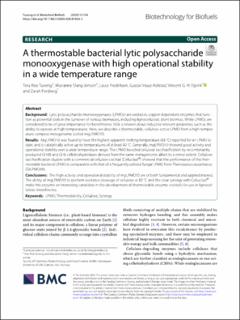| dc.contributor.author | Tuveng, Tina Rise | |
| dc.contributor.author | Jensen, Marianne Slang | |
| dc.contributor.author | Fredriksen, Lasse | |
| dc.contributor.author | Vaaje-Kolstad, Gustav | |
| dc.contributor.author | Eijsink, Vincent | |
| dc.contributor.author | Forsberg, Zarah | |
| dc.date.accessioned | 2021-05-27T11:45:06Z | |
| dc.date.available | 2021-05-27T11:45:06Z | |
| dc.date.created | 2021-01-23T18:41:29Z | |
| dc.date.issued | 2020 | |
| dc.identifier.citation | Biotechnology for Biofuels. 2020, 30 (13), . | en_US |
| dc.identifier.issn | 1754-6834 | |
| dc.identifier.uri | https://hdl.handle.net/11250/2756656 | |
| dc.description.abstract | Background: Lytic polysaccharide monooxygenases (LPMOs) are oxidative, copper-dependent enzymes that func tion as powerful tools in the turnover of various biomasses, including lignocellulosic plant biomass. While LPMOs are considered to be of great importance for biorefneries, little is known about industrial relevant properties such as the ability to operate at high temperatures. Here, we describe a thermostable, cellulose-active LPMO from a high-temper ature compost metagenome (called mgLPMO10). Results: MgLPMO10 was found to have the highest apparent melting temperature (83 °C) reported for an LPMO to date, and is catalytically active up to temperatures of at least 80 °C. Generally, mgLPMO10 showed good activity and operational stability over a wide temperature range. The LPMO boosted cellulose saccharifcation by recombinantly produced GH48 and GH6 cellobiohydrolases derived from the same metagenome, albeit to a minor extent. Cellulose saccharifcation studies with a commercial cellulase cocktail (Celluclast®) showed that the performance of this ther mostable bacterial LPMO is comparable with that of a frequently utilized fungal LPMO from Thermoascus aurantiacus (TaLPMO9A). Conclusions: The high activity and operational stability of mgLPMO10 are of both fundamental and applied interest. The ability of mgLPMO10 to perform oxidative cleavage of cellulose at 80 °C and the clear synergy with Celluclast® make this enzyme an interesting candidate in the development of thermostable enzyme cocktails for use in lignocel lulosic biorefneries. | en_US |
| dc.language.iso | eng | en_US |
| dc.rights | Navngivelse 4.0 Internasjonal | * |
| dc.rights.uri | http://creativecommons.org/licenses/by/4.0/deed.no | * |
| dc.title | A thermostable bacterial lytic polysaccharide monooxygenase with high operational stability in a wide temperature range | en_US |
| dc.type | Peer reviewed | en_US |
| dc.type | Journal article | en_US |
| dc.description.version | publishedVersion | en_US |
| dc.source.pagenumber | -15 | en_US |
| dc.source.volume | 30 | en_US |
| dc.source.journal | Biotechnology for Biofuels | en_US |
| dc.source.issue | 13 | en_US |
| dc.identifier.doi | 10.1186/s13068-020-01834-5 | |
| dc.identifier.cristin | 1877677 | |
| dc.relation.project | Norges forskningsråd: 221568 | en_US |
| dc.relation.project | Norges forskningsråd: 268002 | en_US |
| dc.relation.project | Novo Nordisk Fonden: 0055736 | en_US |
| cristin.ispublished | true | |
| cristin.fulltext | original | |
| cristin.qualitycode | 1 | |

